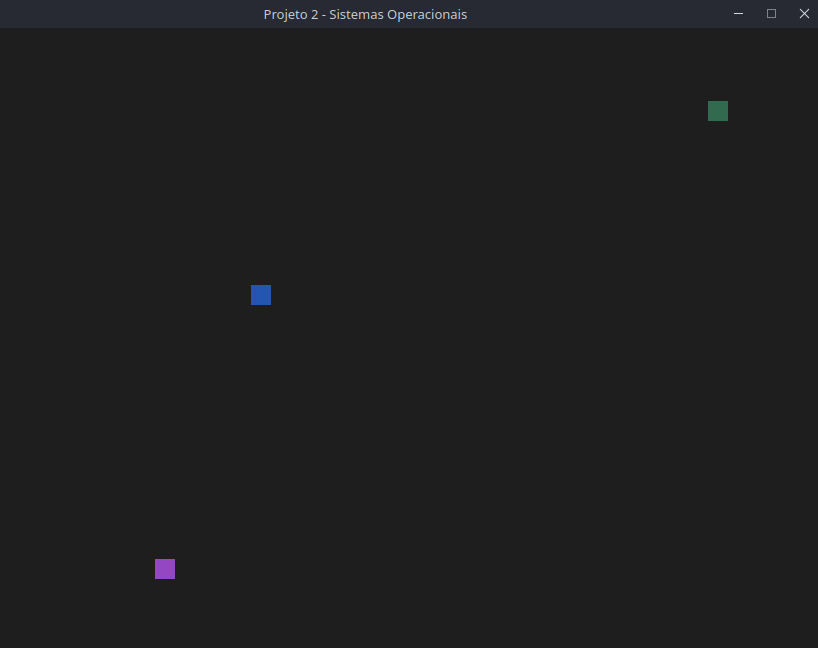Program: projeto.cpp
Version: 1.1
This project was idealized in OS classes. This is a program that simulate three robots with position got it by an camera (in this case, it's used random numbers) and then, the robots itself should move according with that.
The goal is to show how much one thread interferes with the anothers, as so, simulate an robot that it's used in competitions.
-
To compile only useful (working) file:
CFLAGS="-std=c++11 $(pkg-config --cflags --libs sdl2)" # Compile g++ projeto.cpp -o p -lpthread $(echo $CFLAGS) # Those libs need to be in last position, otherwise, the compiler will not link # Execute ./p
The flag -g is used in debug mode
-
The camera corresponds to pos 0, in vectors
-
The gps corresponds to pos 1, in vectors
-
The odometro corresponds to pos 2, in vectors
-
Corresponds to color of a 'blank screen'
-
#define ROBOTS_AMOUNT 3
Corresponds to how much robots do we have
-
#define SOURCES_AMOUNT ROBOTS_AMOUNT
Corresponds to how much sources do we have
-
#define nullptr NULL
-
#define error_on_initialize() \ { printf("Error on initialize. Code: %s\n", SDL_GetError()); }
Used in sdl2 errors
-
const int BOARD_Y = 300; const int BOARD_X = 400;
-
const int TIME_MIN = 0; // in seconds const int TIME_MAX = 4; const int TIME_EQUIPAMENTS[ROBOTS_AMOUNT] = {TIME_MIN, TIME_MIN, TIME_MIN}; // Remember the order in positions...
-
const int BUFFER_SIZE_MAX = 100;
-
int aux_iterator_amount[3] = {0, 1, 2};
Note that the 3 it's because the set up value in macro ROBOTS_AMOUNT
-
const int SCREEN_WIDTH = BOARD_X + ROBOT_HEIGHT, SCREEN_HEIGHT = BOARD_Y + ROBOT_WIDTH;
This is only used in sdl function
-
const int ROBOT_HEIGHT = 20, ROBOT_WIDTH = 20;
-
struct object { int x, y, robot, source; object(int x, int y, int robot, int source) { this->x = x; this->y = y; this->robot = robot; this->source = source; } };
Used in buffer.
-
struct { bool mark_equipament[SOURCES_AMOUNT]; int position[SOURCES_AMOUNT][2]; } robots[ROBOTS_AMOUNT];
Used to storage robots before draw them.
-
struct { Uint8 r, g, b, a; } colors[ROBOTS_AMOUNT + 1] = { {37, 85, 179, 1}, {148, 71, 194, 1}, {49, 106, 79, 1}, {30, 30, 30, 1}};
Store robots and board(last one) colors.
Compiler Version:
- g++ 11 + (11, or newest)
Libs needed:
#include <SDL2/SDL.h> // sdl2
#include <pthread.h> // threads
#include <semaphore.h> // semaphore
#include <unistd.h> // sleep,
#include <cstdlib> // rand
#include <ctime> // seed,
#include <queue> // bufferThe package SDL2-Version:2.0.9 can be found: in ubuntu repo as
sudo apt-get install libsdl2-dev # the command below show the flags of gcc sdl2-config --cflags --libsor here
License and versions:
-
Authors: [ . . . ]
-
Version: 1.0.1
-
License: GPL-3.0
Instructions for program: doc/robotica.pdf
Funcs that are used in thread (working):
-
source_rand
-
make_robots
-
set_to_draw
-
draw
In version 1.0, draw function shows on terminal. In version 1.1+ shows in window.
To debug the threads you can use GBD:
Remember that, to debug your code, you need to use the -g flag when compiling.
Useful commands to GDB:
gdb a.out -- Start GDB;
run -- Execute the runnable file 'a.out';
backtrace -- Show last executions (frames);
frame N -- Select frame N;
print var -- Print some variable (e.g., from frame);
kill -- Kill program running;
break N -- BreakPoint. Showed in frame too;
next -- Continue execution
See more on: Unknow Road
GDB commands to loop until get error
set $n = 100 while $n-- > 0 printf "\n\n\n\t\tStarting program\n" run if $_siginfo printf "\n\n\n\t\tReceived signal %d, stopping\n", $_siginfo.si_signo loop_break else printf "\n\n\n\t\tProgram exited with Success!\n" end end
Debug functions:
void debug_buffer() { while (!buffer.empty()) { printf("Robot: %d, Source: %d, Pos: (%d,%d)\n", buffer.front().robot, buffer.front().source, buffer.front().x, buffer.front().y); buffer.pop(); } }void debug_robots() { for (int i = 0; i < ROBOTS_AMOUNT; i++) { printf("Robot[%d]:\n", i); printf("\tSource mark: {%d,%d,%d}\n", robots[i].mark_equipament[0], robots[i].mark_equipament[1], robots[i].mark_equipament[2]); printf("\tPosition:\n"); printf("\t\tSource [0]: (%d,%d)\n", robots[i].position[0][0], robots[i].position[0][1]); printf("\t\tSource [1]: (%d,%d)\n", robots[i].position[1][0], robots[i].position[1][1]); printf("\t\tSource [2]: (%d,%d)\n", robots[i].position[2][0], robots[i].position[2][1]); } }void debug_robots_to_draw() { for (int i = 0; i < ROBOTS_AMOUNT; i++) { printf("Draw robot %d:\n", i); printf("\tPos: (%d,%d)\n", robots_to_draw[i].x, robots_to_draw[i].y); } }
To compile SDL2 on linux:
./configure make sudo make install
Some SDL2 tutorials links:
